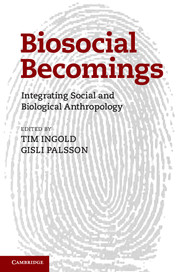Book contents
- Frontmatter
- Contents
- Preface
- 1 Prospect
- 2 Ensembles of biosocial relations
- 3 Blurring the biological and social in human becomings
- 4 Life-in-the-making: epigenesis, biocultural environments and human becomings
- 5 Thalassaemic lives as stories of becoming: mediated biologies and genetic (un)certainties
- 6 Shedding our selves: perspectivism, the bounded subject and the nature–culture divide
- 7 Reflections on a collective brain at work: one week in the working life of an NGO team in urban Morocco
- 8 The habits of water: marginality and the sacralization of non-humans in North-Eastern Ghana
- 9 ‘Bringing wood to life’: lines, flows and materials in a Swazi sawmill
- 10 Humanity and life as the perpetual maintenance of specific efforts: a reappraisal of animism
- 11 Ravelling/unravelling: being-in-the-world and falling-out-of-the-world
- 12 Retrospect
- References
- Notes on the contributors
- Index
3 - Blurring the biological and social in human becomings
Published online by Cambridge University Press: 05 June 2014
- Frontmatter
- Contents
- Preface
- 1 Prospect
- 2 Ensembles of biosocial relations
- 3 Blurring the biological and social in human becomings
- 4 Life-in-the-making: epigenesis, biocultural environments and human becomings
- 5 Thalassaemic lives as stories of becoming: mediated biologies and genetic (un)certainties
- 6 Shedding our selves: perspectivism, the bounded subject and the nature–culture divide
- 7 Reflections on a collective brain at work: one week in the working life of an NGO team in urban Morocco
- 8 The habits of water: marginality and the sacralization of non-humans in North-Eastern Ghana
- 9 ‘Bringing wood to life’: lines, flows and materials in a Swazi sawmill
- 10 Humanity and life as the perpetual maintenance of specific efforts: a reappraisal of animism
- 11 Ravelling/unravelling: being-in-the-world and falling-out-of-the-world
- 12 Retrospect
- References
- Notes on the contributors
- Index
Summary
Introduction
Generally, evolutionary approaches to understanding humanity focus on the fossil record, on biological influences on human behaviour, or on human biological development. Equally, many social anthropologists focus on stories and experiences of being human and the trajectories and contexts of our lives as social symbolic creatures. Recently, there has been an increasing integration of perspectives that destabilize such boundaries and that focus, emphatically, on the myriad processes of becoming human, rather than on the state of being human (Dunbar et al. 2010, Ingold 2011, Jeeves 2011, Sussman and Cloninger 2011, Fuentes 2012). Bypassing the conceptualization of the biological and social as distinct domains of being, and thinking of them rather as intertwined processes of becoming, presents a powerful approach for anthropology. Specifically, I suggest that we need to adopt an integrative biosocial approach in order to evaluate the evolution of various human patterns (Ingold 1996, 2000, 2001a, 2007c, Fuentes 2009b, Schultz 2009). This means we should envision a myriad of entangled agents in the processes of becoming human. In this chapter I will summarize how the integration of innovative perspectives in evolutionary theory with ideas from both social and biological anthropology should provide us with more effective toolkits with which to examine patterns and processes of human becoming.
But first, we need to clarify, and move beyond, the often used and rightfully maligned dichotomy of nature and nurture in its modern form. On the one hand we have the ‘social constructivist’ stating that human nature is essentially, but not solely, a product of learning and socialization, and that it is socially constructed. On the other hand we have the ‘Darwinian’ view that human nature is essentially, but not solely, the product of natural selection. Advocates of both these perspectives hold that they best represent the real basis of why humans do what they do. Both are too simplistic to be of any use, but they remain present, although with thankfully decreasing prevalence, in academic discourse on human evolution (Fuentes 2009b, 2012, Schultz 2009, Jeeves 2011).
- Type
- Chapter
- Information
- Biosocial BecomingsIntegrating Social and Biological Anthropology, pp. 42 - 58Publisher: Cambridge University PressPrint publication year: 2013
- 11
- Cited by



